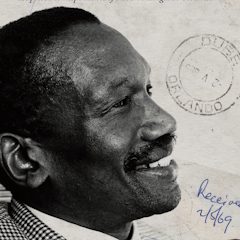
Articles on Steve Biko
Displaying 1 - 20 of 37 articles

Struggle songs are relevant even in the post apartheid context because they continue to be an important way in which people deliberate on issues.

Robert Sobukwe was once perceived to possess more revolutionary potential than Nelson Mandela.

Archbishop Desmond Tutu didn’t stop his fight for human rights once apartheid came to a formal end in 1994. He continued to speak critically against politicians who abused their power.

Jackson Mthembu’s death drives home the seriousness of the COVID-19 pandemic in the country.

Journalists need to hold firmly to the ethical standards that assure audiences their work is reliable and credible.

His appearance on behalf of the families of mine workers shot by the police at the Marikana Commission of Inquiry was just one of his efforts to seek justice for the poor and marginalised.

South Africa’s history shows that mobilising white privilege can be a useful tool for advancing the struggle against racism.

An ongoing study shows that storytelling can positively increase self-awareness in young people, especially if they can relate to the stories. But in Africa access to story platforms is limited.

It seems that former president FW De Klerk continues to find it hard to accept that apartheid was a crime against humanity.

Black consciousness in South Africa changed blacks and whites.

The book depicts how Onkgopotse Tiro’s time at Turfloop amounted to a revolutionising political script for generations to come.

In South Africa’s criminal justice system post-1994, the Timol case is the first to enact what can be properly understood as restorative justice.

Political books touches a certain chord in South African society that makes them bestsellers.

Fifty years after the founding of South African Students’ Organisation this anti-apartheid movement remains a model for student activists.

A collection of prison letters provides a peek into the suffering of South African liberation hero, Robert Sobukwe.

Hugh Lewin is best known for two books that arose from his early involvement in the anti-apartheid underground.

Social psychologist Ignacio Martín-Baró’s work reminds us of the urgency to bring all psychology into the orbit of liberation. Doing so allows a necessarily ambitious conception of liberation.

South African jazz veteran Jonas Gwangwa has been getting recognition for the pivotal role he played in ‘singing down apartheid.’

The ANC has worked hard to monopolise the history of the anti-apartheid struggle – meaning transformational figures are being left out.

Generational rebellion is an enduring feature of all societies. Indeed, it is the dynamic through which societies renew themselves and move forward.
